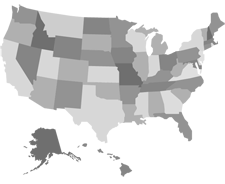Rates and Fees
At SameDayPayday.com, our goal is to help applicants with their loan needs. We do not want to add to your financial difficulties.
Many consumers may think that borrowing money online isn’t that serious of a financial commitment. Payday loans are designed for true emergencies and should not be considered a solution to long-term debt problems. The full amount of the loan is generally due to be repaid within two weeks or at your next payday. It is important that you carefully consider this fact and that you are certain you will be able to repay the loan in this short amount of time.
If you are in serious financial distress, we urge you to investigate other possible sources of cash funds before committing to a payday loan.
Loan Fees
Conveniences come with a cost - The short borrowing time combined with an unsecured loan (no collateral), expect to pay higher APRs than traditional loans.
SameDayPayday.com does not write loans or extend credit. Every lender in our network determines the terms and conditions of every payday loan they approve, including fees, rates, and APRs. These terms are usually based on the applicant’s credit history, current income, and level of outstanding debt. Annual Percentage Rates (APRs) within the payday loan industry can range from 260.71% to 1825%. This APR range is not your finance charge. You will find out your finance charge after you submit your application.
(14 day minimum)
Once approved, it is your responsibility as an educated consumer to review and understand all the terms and conditions of your loan agreement. The time to ask questions is before you legally commit to the loan contract, not after. By law, lenders must disclose all fees, rates, APRs and terms of your loan prior to asking you to sign.
Contact us at any time. Any questions or concerns regarding existing loans, fees, and terms should be directed towards the lender.
Implications of Late or Non-Payment
Late and partial payments. Not paying the full amount of principal by the agreed-upon date may bring additional finance charges and fees, in additional to the unpaid loan amount. Review the late payment policy in the loan documents provided by the lender before signing your e-signature.
The implications of nonpayment are severe. You must be aware that if you fail to repay your loan when it is due, the lender may start collection proceedings against you. This will cost you even more in penalties, fees, interest, and court costs.
Renewals and extensions are not always available. Depending on each lenders policy or the state you reside, not all lenders can offer a renewal/extension - meaning that you cannot extend your loan for a longer period of time.
Collection and impact to credit. In accordance with federal regulations, lenders may attempt to contact borrowers to arrange payment via one or more authorized methods, including but not limited to phone calls and emails. Late or missed payments, delinquencies, and defaults may be reported to major credit bureaus which could negatively affect your credit.
State Guides
- Alabama
- Alaska
- Arizona
- Arkansas
- California
- Colorado
- Connecticut
- Delaware
- District of Columbia
- Florida
- Georgia
- Hawaii
- Idaho
- Illinois
- Indiana
- Iowa
- Kansas
- Kentucky
- Louisiana
- Maine
- Maryland
- Massachusetts
- Michigan
- Minnesota
- Mississippi
- Missouri
- Montana
- Nebraska
- Nevada
- New Hampshire
- New Jersey
- New Mexico
- New York
- North Carolina
- North Dakota
- Ohio
- Oklahoma
- Oregon
- Pennsylvania
- Rhode Island
- South Carolina
- South Dakota
- Tennessee
- Texas
- Utah
- Vermont
- Virginia
- Washington
- West Virginia
- Wisconsin
- Wyoming



